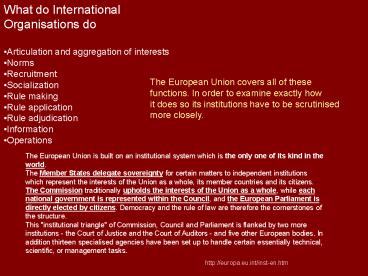The European Union and its Institutions - PowerPoint PPT Presentation
1 / 20
Title:
The European Union and its Institutions
Description:
Title: The European Union and its Institutions Author: James Anthony Mc Donough Last modified by: jmorrison Created Date: 11/7/2002 10:53:19 PM Document presentation ... – PowerPoint PPT presentation
Number of Views:188
Avg rating:3.0/5.0
Title: The European Union and its Institutions
1
- What do International Organisations do
- Articulation and aggregation of interests
- Norms
- Recruitment
- Socialization
- Rule making
- Rule application
- Rule adjudication
- Information
- Operations
The European Union covers all of these
functions. In order to examine exactly how it
does so its institutions have to be
scrutinised more closely.
The European Union is built on an institutional
system which is the only one of its kind in the
world. The Member States delegate sovereignty for
certain matters to independent institutions which
represent the interests of the Union as a whole,
its member countries and its citizens. The
Commission traditionally upholds the interests of
the Union as a whole, while each national
government is represented within the Council, and
the European Parliament is directly elected by
citizens. Democracy and the rule of law are
therefore the cornerstones of the structure. This
"institutional triangle" of Commission, Council
and Parliament is flanked by two more
institutions - the Court of Justice and the Court
of Auditors - and five other European bodies. In
addition thirteen specialised agencies have been
set up to handle certain essentially technical,
scientific, or management tasks.
http//europa.eu.int/inst-en.htm
2
Let us introduce ourselves to the European Union
Let us remind ourselves about The Council of
Europe
Intergovernmental cooperation Supranational
cooperation
Intergovernmental cooperation Between 45 states
Institutions (Committee of Ministers The foreign
Ministers of the States, Parliamentary
Assembly Delegates from national parliaments)
Institutions Commission, European
Council, Council of Ministers, European
Parliament Court of Justice, court of
Auditors Ombudsman
Also, financial bodies, advisory bodies,
Interinstitutional bodies, decentralised bodies
of the European Communities
Output Conventions and Agreements
Output Regulations, Directives,
Decisions Recommendations, and Opinions. The
first three are justiciable
3
The European Union and its Institutions
- the EU cannot be understood without intimate
knowledge of its institutions - John Peterson Michael Shackleton in The
institutions of the European Union, 2002 - Rien nest possible sans les hommes, rien nest
durable sans les institutions - Jean Monnet, 1976
4
Institutions?
- What do we mean by institutions?
- There are many competing definitions
- A useful way to understand them
- Arenas where power and influence are exercised,
regardless of the precise legal status of the
organizations or bodies that preside over them
and - Rules and practices that influence and constitute
human behaviour
5
The study of institutions
- Neo-institutionalists
- They insist that political behaviour is
determined in fundamental ways by the nature of
political institutions, how they are constructed
and how power is distributed between them
6
Why study EU institutions?
- EU institutions
- young,
- experimental
- yet have changed little over time,
- their institutional cultures, norms are deeply
ingrained
7
EU Institutions what about them
- They matter vehicles used by the Unions member
governments to enforce the terms of the bargains
they make with each other - But also, they have powers accrued over time and
this gives them substantial autonomy
8
EU Institutions what about them
- They possess rational-legal authority to make
rules - They create social knowledge in less formal ways,
by defining shared European tasks, creating new
categories of actors, forming new interests for
actors
9
EU Institutions what about them
- They fascinate because they are powerful yet
mostly unloved by European citizens - Citizens dont have a sense of ownership of the
EU - Low EP turn-out, Nos in referenda all show
that the EUs institutions have become
dysfunctional - They seem obsessed with their own internal rules
and neglectful of their missions
10
EU Institutions what about them
- They link Brussels to national EU capitals and,
they link Europe to international politics - EU crucial member of WTO the voice of Europe
in IOs ranging from the UN to the G8 to the
Korean Economic Development Organization - They are increasingly more powerful actors in the
international community
11
Their core functions
- To provide political direction
- To manage the Union
- To integrate interests
12
Pat Cox, President of the European Parliament (
2002 2004)
13
European Parliament Louise Weiss Building
14
Strasbourg
Brussels. Photo unavailable
Le Plateau Kirchberg, Luxembourg
15
Commission of the European Union 2000 - 2004
16
No Building!!
17
European Council Italian Presidency June Dec
2003
18
Justus Lipsius Building, Brussels
19
European Parliament the future? European
Council the future? European Commission the
future?
20
Intergovernmental Conference to finalize the new
Constitution, opened 4 October 2003































